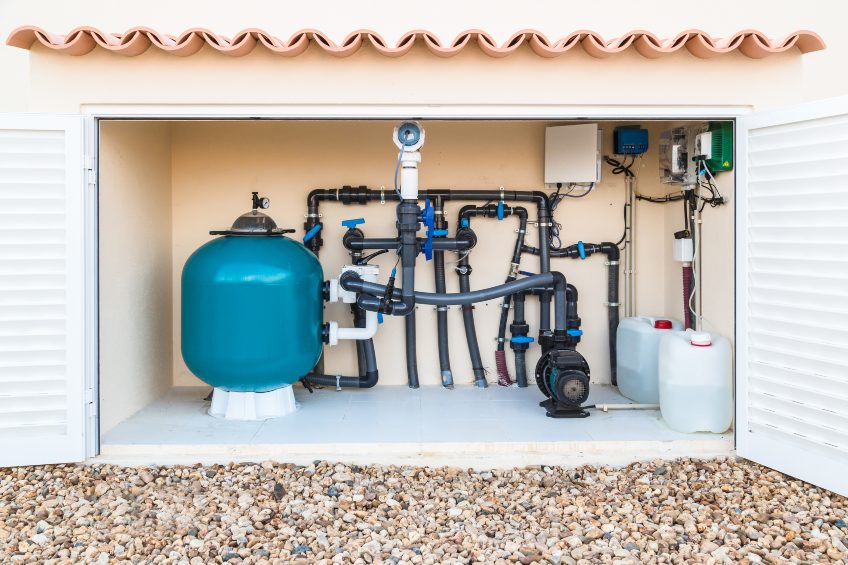
Whether it’s freezing temperatures, a storm, a power outage, or a personal emergency that leads to pool equipment damage, don’t give up on it! Here are the steps to take if you experience damage to your pool equipment.
1. Clean Your Pool:
The first thing you can do after a disaster or emergency is to clean your pool. Clearing your pool of debris will help you visually identify problems with your pool’s surfacing, tiling, and equipment. Use your skimmer and pool brush to clear out dirt and debris. If your pool has frozen and has more than half an inch of ice, you may have to wait until the ice melts to get to debris trapped in or under the ice. If leaves and other debris flew into your pool from winds and rain, clean all of the large waste out of your pool. Then clean the water along with your skimmer baskets and pump trap. Don’t get into the water until it’s clean and sanitized. And don’t use your pool vacuum until you inspect your pool and equipment. You could make your problems worse!
2. Inspect Your Pool Equipment:
After cleaning your pool, check out your pool pump and electrical systems. Look for cracked pipes, valves, and housings. If you see cracks anywhere throughout your pool filtration and circulation system, it’s probably unwise to run your equipment. Small leaks from cracked pipes and pool equipment can grow quickly when pressurized, and flooded electrical systems can result in further catastrophe. Unless you repair the leaks, you should turn off the power until you can get a pool service tech out to inspect the damage. Look closely at your pool equipment’s electrical systems. Make sure the power is off by turning off your pool equipment’s circuit breaker. Remove electrical covers and inspect electrical boxes for water damage. Dry out your equipment, and wait 24 hours before you power it up again. If you find significant ice or water damage to your equipment, call a pool service company to inspect the damaged area. But while you wait for your appointment, there are still more steps you can take.
3. Set Your Water Level :
Rain and snowmelt can add significant amounts of untreated water to your pool. But don’t be tempted to drain it below recommended levels. Draining your pool can cause it to come out of the ground or even cave in. If your pool is frozen, don’t attempt to lower the water level until it melts. Doing so may cause damage to your pool cover or liner. If you already see ice damage to tiles and other pool surfaces, you might want to consider pool renovation services to keep them from getting worse. Once your pool is melted and clean, set your pool to its proper level by draining or filling it to the midline of the skimmer openings. When you get your equipment running again, the skimmer will then be able to help clean the pool.
4. Test Your Pool’s Chemical Levels:
Bad weather like heavy rains, hail and melting snow and ice have likely dirtied your pool water and made it unsafe to swim in. Once you’ve completed the above steps, you need to check its chemical levels even if it still looks clean. If the water in your pool isn’t balanced, add a shock treatment to get it back in line. Don’t let anyone in the pool for 8 hours after you shock it. If your pool equipment is operable, run your filtration system continuously until the water is clear. Once the pool is balanced and the water is clear, reset your pool equipment to its normal cycle. Even if your pool system appears to have made it through freezing temperatures or a severe storm, call in a professional to take a look. Some problems can be hard to detect and still lead to costly repairs.
5. Contact Your Insurance Company:
Find out if your homeowner’s insurance policy covers pool repairs that occur as a result of bad weather or freezing temperatures. It usually depends on your insurance broker and whether you have additional riders for your swimming pool. Also, ask if your home warranty covers your pool. Many homeowners’ policies provide coverage for swimming pool equipment like pumps, filters, and pipes if you took proper precautions, such as maintaining heat in the pool plumbing system or draining the plumbing system. You may also be covered for damage resulting from the escape of water from damaged pool equipment.
6. Stay Prepared:
If your equipment has been damaged, get it repaired as soon as you can. Leaving damaged equipment exposed to the elements can result in even more costly repairs. Be patient when trying to find someone to look at your pool equipment. Don’t book with the first pool repair company you can find. Hire quality contractors that are licensed and insured. If you stay on top of your pool maintenance, preparing your pool and pool equipment for natural disasters, freezing temperatures, and power outages will only take an hour or two. Don’t wait until the last minute. Prep your pool as soon as temperatures reach the 30s. Work with your pool builder to come up with an emergency plan for your pool. Running your pump 24 hours a day during bad weather might not be an option when power outages are possible.
What to Do If You Lose Power to Your Pool Equipment:
During and after storms and disasters, power outages are likely. Cover and insulate your system’s pipes as best you can. You don’t want your pump struggling once the power comes back on, inviting further damage. Once you lose power to your equipment, either because you shut it off or because of bad weather, follow these steps:
- Turn off all power switches and the breakers to your equipment
- Open your pool filter’s air relief valve
- Remove the drain plugs from your pool heater or heat pump
- Remove the lid and drain plugs from your pool pump, filter, and any other unit that holds water
Call Gold Medal Pools for Your Pool Service:
After the freezing temperatures or bad weather passes, have a Gold Medal Pools technician come out to inspect your system and identify and assess any damage. Let us help you put your pool equipment damage behind you. Swimming season will be back soon enough. Getting your pool equipment repaired and running quickly is key to making sure your pool stays healthy and lasts a lifetime. Contact us now to book your appointment.





